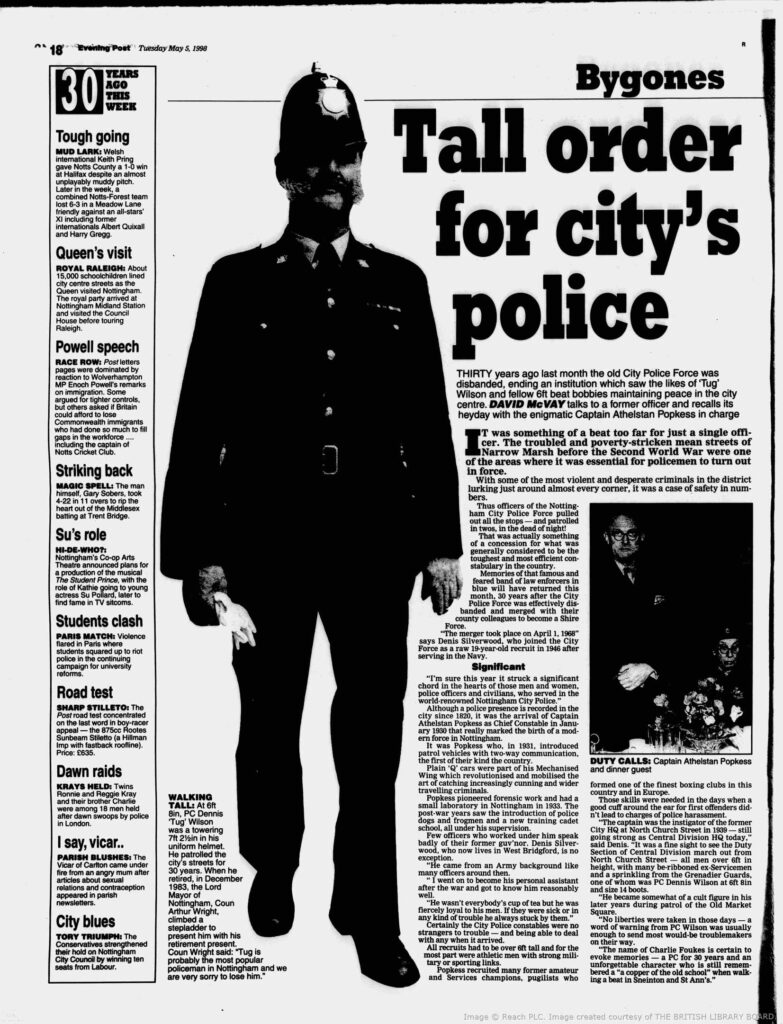The 9 Principles of Policing were, apparently, established by Robert Peel and his associates back in 1829, with the “General Instructions” being issued to each constable. The policing principles were expanded, as below, in the 1948 book, A Short History of the British Police by Charles Reith.
1. To prevent crime and disorder, as an alternative to their repression by military force and severity of legal punishment.
2. To recognise always that the power of the police to fulfil their functions and duties is dependent on public approval of their existence, actions and behaviour, and on their ability to secure and maintain public respect.
3. To recognise always that to secure and maintain the respect and approval of the public means also the securing of the willing co-operation of the public in the task of securing observance of laws.
4. To recognise always that the extent to which the co-operation of the public can be secured diminishes proportionately the necessity of the use of physical force and compulsion for achieving police objectives.
5. To seek and preserve public favour, not by pandering to public opinion, but by constantly demonstrating absolutely impartial service to law, in complete independence of policy, and without regard to the justice or injustice of the substance of individual laws, by ready offering of individual service and friendship to all members of the public without regard to their wealth or social standing, by ready exercise of courtesy and friendly good humour, and by ready offering of individual sacrifice in protecting and preserving life.
6. To use physical force only when the exercise of persuasion, advice and warning is found to be insufficient to obtain public co-operation to an extent necessary to secure observance of law or to restore order, and to use only the minimum degree of physical force which is necessary on any particular occasion for achieving a police objective.
7. To maintain at all times a relationship with the public that gives reality to the historic tradition that the police are the public and that the public are the police, the police being only members of the public who are paid to give full-time attention to duties which are incumbent on every citizen in the interests of community welfare and existence.
8. To recognise always the need for strict adherence to police-executive functions, and to refrain from even seeming to usurp the powers of the judiciary of avenging individuals or the State, and of authoritatively judging guilt and punishing the guilty.
9. To recognise always that the test of police efficiency is the absence of crime and disorder, and not the visible evidence of police action in dealing with them.
The role of a Constable was well-known for hundreds of years prior to the formation of the ‘Peelers’:
“In England the office of constable was in existence during Henry I’s reign. The principal duty of the constable, which was a military term at this stage, was to command the army.
The term constable first appeared after the Norman conquest, and towards the end of the 12th century acquired the local significance it has held ever since.
The Statute of Westminster 1285 enshrined the principles of two high constables appointed in every hundred with responsibility for suppressing riots and violent crimes and for the arming of the militia to enable them to do so.” Source: The Office of Constable
From the Middle Ages, there were local officials in England called constables who were responsible for keeping the peace. Men took it in turns to take the post for one year and it was unpaid. Also if somebody witnessed a crime he was supposed to raise the alarm and all men were supposed to help catch the criminal. This was called hue and cry. It was abolished in 1827.
From 1663 there were paid nightwatchmen in London. In the late 18th century many provincial towns also employed nightwatchmen to patrol the streets.
Meanwhile, in 1749 a London magistrate called Henry Fielding formed the Bow Street Runners to catch criminals. (They got their name because his office was on Bow Street). In the 18th century, London was Britain’s busiest port. So in 1798, the River Police were founded to protect cargoes.
Police in the 19th Century However at the beginning of the 19th century many people in Britain were suspicious of a full-time police force. They feared the government might use it to oppress them. Yet the Industrial Revolution meant that life was changing rapidly. Cities mushroomed and the old system became obsolete.
A police force in England was formed in London in 1829 by Sir Robert Peel. (Policemen were called Bobbies or Peelers after him. Sometimes they were called coppers from the old English word cop, meaning to grab or seize hold of). The first British policemen were not armed with guns. Instead, they carried truncheons and rattles. (Policemen carried whistles from the 1880s). They wore top hats. (They were later replaced by helmets designed to protect the head). Constable Joseph Grantham was the first policeman to be killed on duty in 1830.
In 1835 local government in England was reformed. All boroughs were compelled to form their own police forces. In 1839 counties were permitted but not compelled to form police forces for rural areas. (It was made compulsory in 1856). A Brief History of the British Police
it’s interesting to note the origin of the expression, ‘cop’ – as in to grab hold of and the still-prevalent expression, “It’s a fair cop.”
Now, having had first hand experience of how the police conduct themselves in public and, indeed, having won a County Court Tort Claim agaiinst Nottinghamshire Police Force for unlawful imprisonment, it scarcely goes without saying that I do not hold them in high regard.
And yet, it is clear that by the 9 principles laid out above, the origins of policing were founded in truth and honour.
It stands as a code of honour, to be upheld by all constables and, of equal import, it emphasises that the constable is entrusted in the role of a public servant whose first duty is to prevent crime and disorder – to keep the peace.
To this day, the individual who takes on the role has to swear an oath,
“I do solemnly and sincerely declare and affirm that I will well and truly serve the Queen in the office of constable, with fairness, integrity, diligence and impartiality, upholding fundamental human rights and according equal respect to all people; and that I will, to the best of my power, cause the peace to be kept and preserved and prevent all offences against people and property; and that while I continue to hold the said office I will to the best of my skill and knowledge discharge all the duties thereof faithfully according to law.”
The now discredited Nottinghamshire Police Force used to have a reasonable requirement – “all recruits had to be over 6ft tall and for the most part were athletic men with strong military or sporting links.”

All of which is a preamble to my forthcoming Rogue Cast in which I will go through each of the principles and provide examples from my own direct experience of the current state of policing in the lands known as Britain.
As ever, a huge thank you to all those who have and continue to support the work at RogueMale, especially David R and Stephen (aka Sam) for their generosity.
Further reading and listening:
1. The Cop Who Pepper-srayed himself
2. The successful Tort Claim for false imprisonment
3. The Unlawful Role of the Police in the Great British Mortgage Swindle
4. Arrested without a Warrant at Newcastle Airport

Here arejust a few observations of our police in recent years. They are no longer Constabluaries, but Forces. They are coporations, therefore working to enforce unlawful Acts and Statutes for the collection of revenue. The personel themselves are Officers not Constables, which are totally different. It is my understanding that to impersonate a Constable is a crime that carries a hefty fine and possibly imprisonment. It is my opinion that many Chief Constables are most likely Freemasons which therefore leaves many questions about integrity and justice being served.
I completely agree with you – like every institutiion of public service, the UK police force is a captured operation and the freemasonic influence runs deep. As far as I know, the oath of constable is still in full cause and effect and it is the office of constable that the individuals are acting under – which is proof, were it needed, that they are acting fraudulently, as you write.